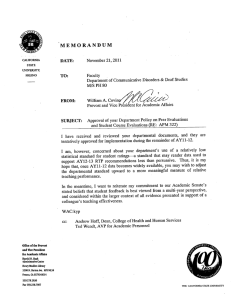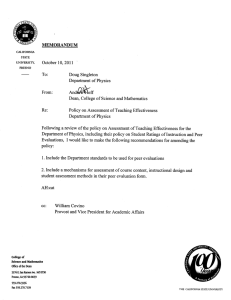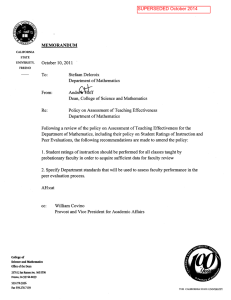* MEMORANDUM
advertisement
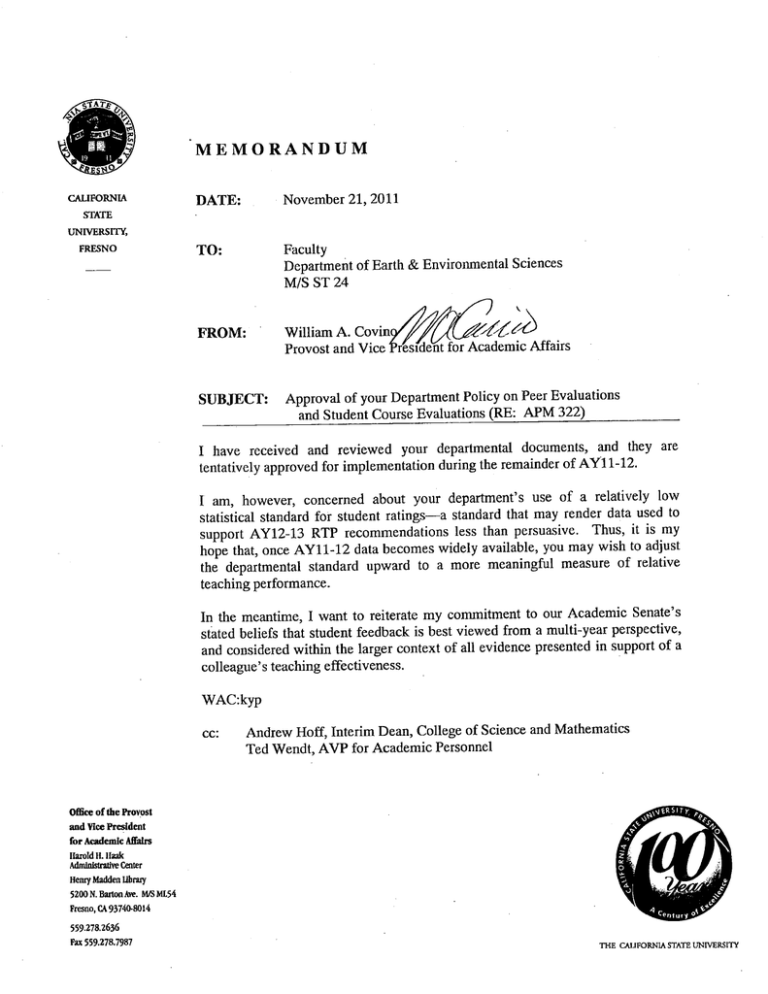
* MEMORANDUM CALIFORNIA DATE: November 21, 2011 TO: Faculty Department of Earth & Environmental Sciences M/S ST 24 STATE UNIVERSITY, FRESNO FROM: z William A. Covi71/ /rtylW) Provost and Vice resident for Academic Affairs SUBJECT: Approval of your Department Policy on Peer Evaluations and Student Course Evaluations (RE: APM 322) I have received and reviewed your departmental documents, and they are tentatively approved for implementation during the remainder of AY11-12. I am, however, concerned about your department's use of a relatively low statistical standard for student ratings—a standard that may render data used to support AY12-13 RTP recommendations less than persuasive. Thus, it is my hope that, once AY11-12 data becomes widely available, you may wish to adjust the departmental standard upward to a more meaningful measure of relative teaching performance. In the meantime, I want to reiterate my commitment to our Academic Senate's stated beliefs that student feedback is best viewed from a multi-year perspective, and considered within the larger context of all evidence presented in support of a colleague's teaching effectiveness. WAC:kyp cc: Andrew Hoff, Interim Dean, College of Science and Mathematics Ted Wendt, AVP for Academic Personnel Office of the Provost and Vice President for Academic Affairs Harold H. liaak Administrative Center Henry Madden llbrary 5200 N. Barton Ave. MIS ML54 Fresno, CA 93740-8014 559.278.2636 Fax 559.278.7987 THE CALIFORNIA STATE UNIVERSITY MEMORANDUM CALIFORNIA STATE UNIVERSITY, October 10, 2011 FRESNO To: Steve Lewis Department of Earth and Environmental Sciences From: Andra ff Dean, College of Science and Mathematics Re: Policy on Assessment of Teaching Effectiveness Department of Earth and Environmental Sciences Following a review of the policy on Assessment of Teaching Effectiveness for the Department of Earth and Environmental Sciences, including the policy on Student Ratings of Instruction and Peer Evaluations, the following recommendations are made to amend the policy: 1. Student ratings of instruction should be performed for all classes taught by probationary faculty in order to acquire sufficient data for faculty review 2. Specify Department standards and a Department form that will be used to assess faculty performance in the peer evaluation process. AH:cat CC: William Covino Provost and Vice President for Academic Affairs College of Science and Mathematics Office of the Dean 25768. San Eamon Ave. 1WS ST90 Fresno, CA 93740-8039 559.278.3936 Fax 559.278.7139 THE CALIFORNIA STATE UNIVERSITY DEPARTMENT OF EARTH & ENVIRONMENTAL SCIENCES POLICY ON ASSESSMENT OF TEACHING EFFECTIVENESS APM 322 is the official policy on the Assessment of Teaching Effectiveness. This Departmental policy is designed to further define requirements at the Departmental level as specified in APM 322. STUDENT RATINGS OF INSTRUCTION Each faculty member shall have a minimum of two sections rated by students annually. While the IDEA Short Form will be the standard paper instrument for the campus, faculty may elect to use either the Diagnostic Form or Online version. Student ratings of instruction shall be assessed to identify patterns and trends of teaching performance and effectiveness. It is expected that the faculty member shall meet or exceed the department standard 3.0 out of 5.01 using adjusted or unadjusted scores, whichever are higher, on a regular basis; however, it is more important to evaluate on the basis of multi-year trends rather than focusing on a single course or narrow time frame. PEER EVALUATIONS 1. Frequency a. For part-time temporary faculty, the first time a course is taught by the instructor and, thereafter, at least one section every other year of employment regardless of a break in service. b. For full-time temporary faculty, two sections each semester for the first year and two sections each academic year thereafter. c. For probationary faculty, two sections (to include as many different courses as possible) every semester. d. For tenured faculty, one section each academic year on a rotating basis such that during a five year period the maximum number of different courses is evaluated. 2. Faculty will use the attached Department-approved form to evaluate Course Content, Instructional Design, Instructional Delivery and Assessment methods. OVERALL The Department will follow the guidelines in APM 325, APM 327 and APM 328 when electing committees selected to prepare the overall evaluation of teaching. APPROVAL PROCESS Departmental policies will be submitted to the appropriate School/College Dean and to the Provost for review and approval. Last Updated: October 4, 2011 APM 322b These questions are phrased to be answered using the following code: 1= Definitely false 3= In Between 2= More false than true 4= More true than false 5= Definitely true 1. Compared to other courses at CSUF this course is hard. 2. My interest in the subject matter of this course has increased since taking this class. 3. Organization of the course: the instructor demonstrates appropriate arrangement of topics and logical development of the subject 4. Preparation for class: The instructor exhibits care in planning and organizing materials. 5. Classroom presentation: The instructor is effective in presenting course material. 6. The instructor answers in-class student questions willingly and adequately. 7. The instructor's grading (evaluation of student work i.e. exams) is fair. 8. My college year is (1) Freshman, (2) Sophomore, (3) Junior, (4) Senior, (5) Graduate 9. For me this course is (1) Required GE, (2) Required by major, (3) Elective for major, (4) Other 10. The grade I expect to get in this class is (1) A, (2) B, (3) C, (4) D, (5) F 11. I put in the recommended 2-3 hours of study per hour of class time. 12. I would have majored in Geology or Environmental Science had I taken this course earlier in my academic experience. 13. Laboratory activities contribute valuable insight and information to this course. 14. Laboratory materials are adequate for the activities we are expected to complete. 15. Laboratory activities are well written and relevant to the course. 16. Field trips are a valuable component to this course. 17. Field trips provided information on this subject that cannot be taught in the classroom. CCM C..)-92J-C\ CSL5Th c4.muscpa.,
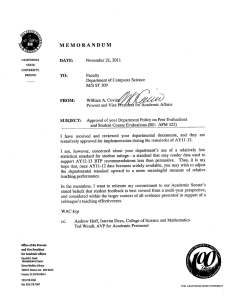
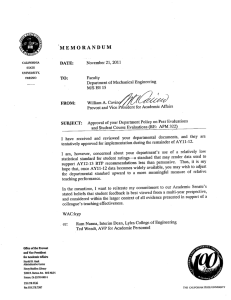
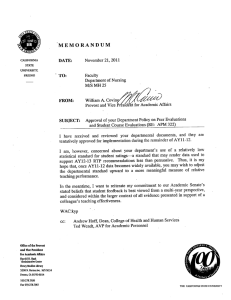
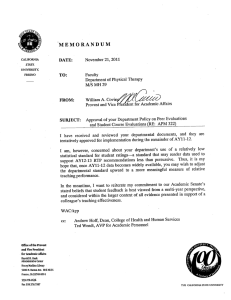
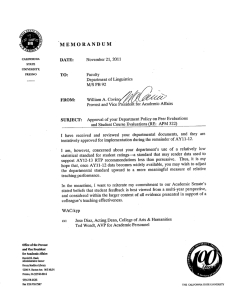
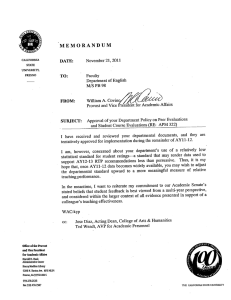
![[BRACKETS INCLUDE SUGGESTED INFORMATION THAT MAY BE INCREASED] DEPARTMENT OF FORESTRY](http://s2.studylib.net/store/data/013068471_1-cfecf471b59af83eb9fbee25e61f8411-300x300.png)
